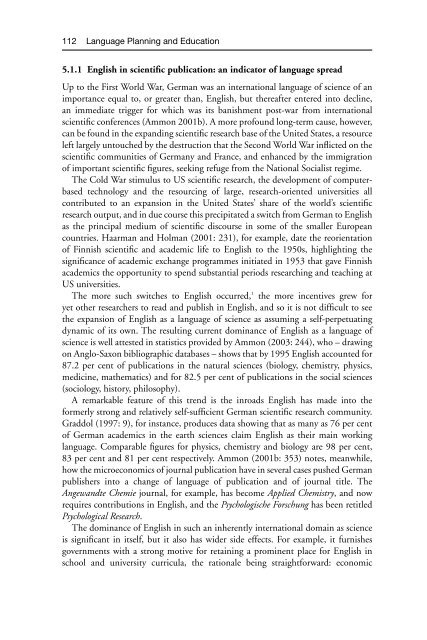Gibson Ferguson Language Planning and Education Edinburgh ...
Gibson Ferguson Language Planning and Education Edinburgh ...
Gibson Ferguson Language Planning and Education Edinburgh ...
You also want an ePaper? Increase the reach of your titles
YUMPU automatically turns print PDFs into web optimized ePapers that Google loves.
112 <strong>Language</strong> <strong>Planning</strong> <strong>and</strong> <strong>Education</strong><br />
5.1.1 English in scientific publication: an indicator of language spread<br />
Up to the First World War, German was an international language of science of an<br />
importance equal to, or greater than, English, but thereafter entered into decline,<br />
an immediate trigger for which was its banishment post-war from international<br />
scientific conferences (Ammon 2001b). A more profound long-term cause, however,<br />
can be found in the exp<strong>and</strong>ing scientific research base of the United States, a resource<br />
left largely untouched by the destruction that the Second World War inflicted on the<br />
scientific communities of Germany <strong>and</strong> France, <strong>and</strong> enhanced by the immigration<br />
of important scientific figures, seeking refuge from the National Socialist regime.<br />
The Cold War stimulus to US scientific research, the development of computerbased<br />
technology <strong>and</strong> the resourcing of large, research-oriented universities all<br />
contributed to an expansion in the United States’ share of the world’s scientific<br />
research output, <strong>and</strong> in due course this precipitated a switch from German to English<br />
as the principal medium of scientific discourse in some of the smaller European<br />
countries. Haarman <strong>and</strong> Holman (2001: 231), for example, date the reorientation<br />
of Finnish scientific <strong>and</strong> academic life to English to the 1950s, highlighting the<br />
significance of academic exchange programmes initiated in 1953 that gave Finnish<br />
academics the opportunity to spend substantial periods researching <strong>and</strong> teaching at<br />
US universities.<br />
The more such switches to English occurred, 1 the more incentives grew for<br />
yet other researchers to read <strong>and</strong> publish in English, <strong>and</strong> so it is not difficult to see<br />
the expansion of English as a language of science as assuming a self-perpetuating<br />
dynamic of its own. The resulting current dominance of English as a language of<br />
science is well attested in statistics provided by Ammon (2003: 244), who – drawing<br />
on Anglo-Saxon bibliographic databases – shows that by 1995 English accounted for<br />
87.2 per cent of publications in the natural sciences (biology, chemistry, physics,<br />
medicine, mathematics) <strong>and</strong> for 82.5 per cent of publications in the social sciences<br />
(sociology, history, philosophy).<br />
A remarkable feature of this trend is the inroads English has made into the<br />
formerly strong <strong>and</strong> relatively self-sufficient German scientific research community.<br />
Graddol (1997: 9), for instance, produces data showing that as many as 76 per cent<br />
of German academics in the earth sciences claim English as their main working<br />
language. Comparable figures for physics, chemistry <strong>and</strong> biology are 98 per cent,<br />
83 per cent <strong>and</strong> 81 per cent respectively. Ammon (2001b: 353) notes, meanwhile,<br />
how the microeconomics of journal publication have in several cases pushed German<br />
publishers into a change of language of publication <strong>and</strong> of journal title. The<br />
Angew<strong>and</strong>te Chemie journal, for example, has become Applied Chemistry, <strong>and</strong> now<br />
requires contributions in English, <strong>and</strong> the Psychologische Forschung has been retitled<br />
Psychological Research.<br />
The dominance of English in such an inherently international domain as science<br />
is significant in itself, but it also has wider side effects. For example, it furnishes<br />
governments with a strong motive for retaining a prominent place for English in<br />
school <strong>and</strong> university curricula, the rationale being straightforward: economic






